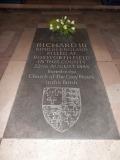- UPDATED
I would like to thank Dr Heather Falvey and Dr Sean Cunningham for all the information they kindly shared with me and all their generous support. All errors, of course, remain my own.

Some time ago, while looking for something completely different and getting carried away by all sorts of distractions, I came across the mention of a “Sergeant of the King’s Bakehouse”.
The reference was to an existing brass in St John the Baptist Church in Shottesbrooke, Berkshire. It shows a man in armour with his hands held in prayer, bare headed with shoulder-length hair. He seems to be standing on a mound of grass, with a flower between his feet.

Underneath is an inscription, which explains that this is Richard Gyll Esq, Sergeant of the Bakehouse for both Henry VII and Henry VIII, and bailiff of the “Seven Hundreds of Cookham and Bray” and that he died on 7 August 1511.
Here lyeth the body of Richard Gyll squyer late sergeat of the Bakehous wt kyng henry VII and also wyth kyng henry the VIII and bayly of the VII hundred of Cokam and Bray.[i]
The reference to an official of a bakehouse caught my eye, because I like baking bread. And it is a necessity, too. For someone used to the variety and taste of German bread, the average Australian bread is not very exciting. Therefore I decided to find out more about Richard Gyll. Fortunately, his will is still extant. It gives us some information about his personal circumstances (see below).
Read more: A Sergeant of the King’s Bakehouse: Richard Gyll (d.1511) Continue reading
